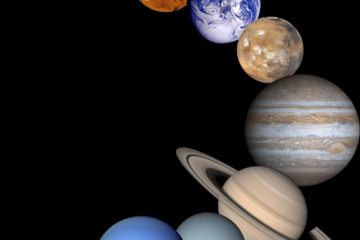Imagine a vast cosmic dance where planets, like intricate pieces of a celestial puzzle, interact harmoniously to form intricate ecosystems. In this article, we delve into the captivating realm of planetary ecosystems, unraveling their definition, significance, and fascinating intricacies. Join us on a journey through the cosmos as we explore the wonders of these interdependent systems that fuel life and balance in the vastness of space.
Table of Contents
- Exploring the Intricacies of Planetary Ecosystems
- Understanding the Interconnected Web of Life
- Preserving Planetary Biodiversity for Future Generations
- Taking Action: Sustainable Practices to Support Planetary Ecosystems
- Q&A
- To Wrap It Up

Exploring the Intricacies of Planetary Ecosystems
Delving into the depths of planetary ecosystems unveils a world of interconnected life forms coexisting in harmony. These complex systems encompass a myriad of organisms, from microscopic bacteria to majestic flora and fauna, all playing vital roles in sustaining the delicate balance of their respective planets.
One fascinating aspect of planetary ecosystems is the interdependence among species, where each organism relies on others for survival. **Biodiversity** thrives in these ecosystems, fostering resilience and adaptability to ever-changing environmental conditions. Through intricate food webs and symbiotic relationships, planetary ecosystems showcase the beauty of nature’s intricate design.
| Planet | Main Ecosystem Feature |
|---|---|
| Earth | Rainforests |
| Mars | Polar Ice Caps |
| Venus | Volcanic Terrain |
Understanding the Interconnected Web of Life
Our planet is a tapestry of interconnected beings, each playing a vital role in the intricate web of life. From the tiniest microbes in the soil to the majestic forests that blanket the earth, every organism contributes to the health and balance of the planetary ecosystem.
**Within this harmonious system, every species, no matter how big or small, has a unique purpose and function. Bees pollinate flowers, trees provide oxygen, and predators keep populations in check. Together, they form a delicate dance of life, where each step affects the whole.**

Preserving Planetary Biodiversity for Future Generations
Preserving planetary biodiversity involves safeguarding the intricate web of life that sustains our ecosystems. Every species, from the smallest microorganism to the largest mammals, plays a crucial role in maintaining the delicate balance of nature. Through conservation efforts and sustainable practices, we can ensure the richness of life on Earth for future generations to marvel at and benefit from.
One way to protect planetary biodiversity is by establishing protected areas where wildlife can thrive undisturbed. These sanctuaries serve as havens for endangered species, allowing them to flourish and contribute to the overall health of the ecosystem. Additionally, promoting awareness and education about the importance of biodiversity conservation can inspire individuals and communities to take action in preserving our planet’s diverse array of life forms. Together, we can work towards a future where the beauty and diversity of our planetary ecosystems remain intact for generations to come.
Taking Action: Sustainable Practices to Support Planetary Ecosystems
In the grand tapestry of existence, planetary ecosystems encompass the intricate web of life that intertwines across Earth’s diverse landscapes. These delicate ecosystems, from lush rainforests to vast oceans, are vital to the sustainability and harmony of our planet. Embracing sustainable practices becomes not just a choice but a necessity to preserve the delicate balance of nature for generations to come.
When we speak of planetary ecosystems, we delve into the interconnectedness of all living organisms, from the tiniest microbes to the largest mammals. Each component plays a crucial role in maintaining the equilibrium of these intricate systems. By adopting sustainable practices such as reforestation, renewable energy sources, and wildlife conservation efforts, we contribute to the resilience and well-being of planetary ecosystems, safeguarding their vitality and beauty for the future. Let’s take a stand and be stewards of our planet, nurturing and protecting the diverse wonders that planetary ecosystems hold within their embrace.
Q&A
Q: What is a Planetary Ecosystem?
A: A planetary ecosystem refers to the intricate web of living organisms, their physical environment, and the interactions that sustain life on a planet.
Q: How are Planetary Ecosystems Formed?
A: Planetary ecosystems are formed through a delicate balance of biotic (living) and abiotic (non-living) components working together to create a sustainable environment for life to thrive.
Q: Why are Planetary Ecosystems Important?
A: Planetary ecosystems play a crucial role in maintaining biodiversity, regulating climate, recycling nutrients, and providing essential ecosystem services that support life on a planetary scale.
Q: What Threats Do Planetary Ecosystems Face?
A: Planetary ecosystems face numerous threats such as deforestation, pollution, climate change, habitat destruction, and overexploitation of natural resources, all of which can disrupt the delicate balance of these complex systems.
Q: How Can We Protect Planetary Ecosystems?
A: Protecting planetary ecosystems requires collective efforts to conserve biodiversity, reduce our carbon footprint, promote sustainable practices, and actively engage in preserving the natural environment for future generations to enjoy.
To Wrap It Up
As we conclude our exploration into the intriguing realms of planetary ecosystems, we invite you to continue marveling at the intricate web of life that blankets our diverse celestial neighbors. From the swirling gases of gas giants to the barren landscapes of rocky planets, each world presents a unique tapestry of interactions that shape its ecosystem. By delving into the definitions and complexities of planetary ecosystems, we gain a deeper appreciation for the interconnectedness of life throughout the cosmos. As we look up at the stars, may we carry with us the wonder and curiosity that drive us to understand and protect these precious ecosystems both here on Earth and beyond. Thank you for joining us on this cosmic journey of discovery.



0 Comments